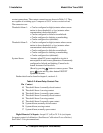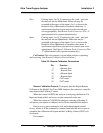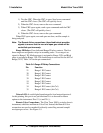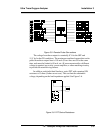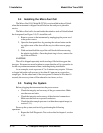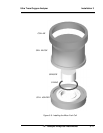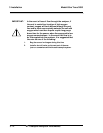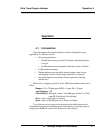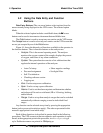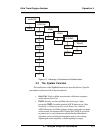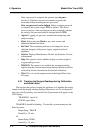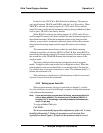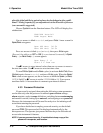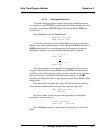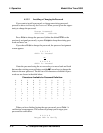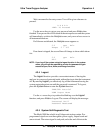
4 Operation Model Ultra Trace 3000
4-2
Teledyne Analytical Instruments
4.2 Using the Data Entry and Function
Buttons
Data Entry Buttons: The < > arrow buttons select options from the
menu currently being displayed on the VFD screen. The selected option
blinks.
When the selected option includes a modifiable item, the
∆∆
∆∆
∆∇ arrow
buttons can be used to increment or decrement that modifiable item.
The
Enter
button is used to accept any new entries on the VFD screen.
The
Escape
button is used to abort any new entries on the VFD screen that
are not yet accepted by use of the
Enter
button.
Figure 4-1 shows the hierarchy of functions available to the operator via
the function buttons. The six function buttons on the analyzer are:
•
Analyze.
This is the normal operating mode. The analyzer
monitors the oxygen content of the sample, displays the percent
of oxygen, and warns of any alarm conditions.
•
System.
The system function consists of six subfunctions that
regulate the internal operations of the analyzer:
• Auto-Cal setup • Show negative readings
• Password assignment • Set digital filter
• Self -Test initiation
• Checking software version
• Logging out.
•
Zero
. Used to set up a zero calibration.
•
Span.
Used to set up a span calibration.
•
Alarms.
Used to set the alarm setpoints and determine whether
each alarm will be active or defeated, HI or LO acting, latching,
and/or failsafe.
•
Range.
Used to set up three analysis ranges that can be switched
automatically with auto-ranging or used as individual fixed
ranges.
Any function can be selected at any time by pressing the appropriate
button (unless password restrictions apply). The order as presented in this
manual is appropriate for an initial setup.
Each of these functions is described in greater detail in the following
procedures. The VFD screen text that accompanies each operation is repro-
duced, at the appropriate point in the procedure, in a Monospaced type
style. Pushbutton names are printed in
Oblique
type.



